|
Books Should Be Free Loyal Books Free Public Domain Audiobooks & eBook Downloads |
|
|
Books Should Be Free Loyal Books Free Public Domain Audiobooks & eBook Downloads |
|
Top Authors |
|---|
|
Book type:
Sort by:
|
By: Rabindranath Tagore (1861-1941) | |
|---|---|
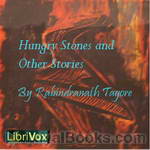 The Hungry Stones and Other Stories
The Hungry Stones and Other Stories
This is a collection of short stories written by the Nobel Laureate Rabindranath Tagore. The stories contained in this volume were translated by several hands. The version of The Victory is the author's own work. The seven stories which follow were translated by Mr. C. F. Andrews, with the help of the author's help. Assistance has also been given by the Rev. E. J. Thompson, Panna Lal Basu, Prabhat Kumar Mukerjii, and the Sister Nivedita. | |
 My Reminiscences
My Reminiscences
These Reminiscences were written and published by the Author in his fiftieth year, shortly before he started on a trip to Europe and America for his failing health in 1912. It was in the course of this trip that he wrote for the first time in the English language for publication. (from preface) | |
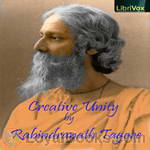 Creative Unity
Creative Unity
Gurudev Rabindranath Tagore talks of the many things he feels is necessary for creativity through joy of unity, he covers many topics like the creative ideal, makes comparisons of creativity between the east and the west, the spirit of freedom and about his idea of an University. | |
 The Post Office
The Post Office
| |
 Stray Birds
Stray Birds
| |
 Chitra, a play in one act
Chitra, a play in one act
| |
 The King of the Dark Chamber
The King of the Dark Chamber
| |
 First Jasmines
First Jasmines
Rabindranath Tagore, was a Bengali polymath who reshaped Bengali literature and music, as well as Indian art with Contextual Modernism in the late 19th and early 20th centuries. Author of Gitanjali and its "profoundly sensitive, fresh and beautiful verse", he became the first non-European to win the Nobel Prize in Literature in 1913. In translation his poetry was viewed as spiritual and mercurial; however, his "elegant prose and magical poetry" remain largely unknown outside Bengal. Tagore introduced new prose and verse forms and the use of colloquial language into Bengali literature, thereby freeing it from traditional models based on classical Sanskrit... | |
 The Fugitive
The Fugitive
| |
 The Spirit of Japan
The Spirit of Japan
| |
 The Cycle of Spring
The Cycle of Spring
| |
By: John Kendrick Bangs (1862-1922) | |
|---|---|
 Alice in Blunderland: an Iridescent Dream
Alice in Blunderland: an Iridescent Dream
John Kendrick Bangs (May 27, 1862 – January 21, 1922) was an American author and satirist, and the creator of modern Bangasian Fantasy, the school of fantasy writing that sets the plot wholly or partially in the afterlife. (Wikipedia)Plot summary: J K Bangs has taken Alice from Lewis Carroll’s “Alice in Wonderland” and lets her on a boring day travel with the Mad Hatter, the March Hare, the Cheshire Cat and the other of Carroll’s familiar characters to Blunderland. The story is a well written Satire, a witty, humorous tale of adventure and city politics, a tale of Alice in a land where nothing is as it should be. (Summary by Lars Rolander) | |
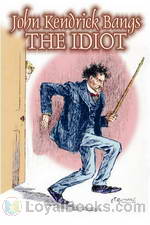 The Idiot
The Idiot
The Idiot is anything but, yet his fellow boarders at Mrs. Smithers-Pedagog’s home for single gentlemen see him as such. His brand of creative thought is dismissed as foolishness yet it continues to get under their skin, because when you’re beneath contempt you can say what you please. – This is the first of John Kendrick Bangs' “Idiot” books and was published by Harper and Brothers in 1895. | |
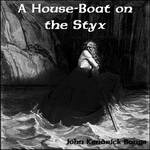 A House-Boat on the Styx
A House-Boat on the Styx
The premise of the book is that everyone who has ever died (up until the time in which the book is set, which seems to be about the time of its publication) has gone to Styx. This does not appear to be the conventional Hell described by Dante in The Inferno, but rather the Hades described in Greek myth (both of which had Styxes): a universal collecting pot for dead souls, regardless of their deeds in life. The book begins with Charon, ferryman of the Styx (in The Inferno, he was the ferryman of the river Acheron) being startled—and annoyed—by the arrival of a house boat on the Styx... | |
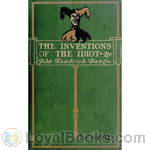 The Inventions of the Idiot
The Inventions of the Idiot
"It was before the Idiot's marriage, and in the days when he was nothing more than a plain boarder in Mrs. Smithers-Pedagog's High-class Home for Single Gentlemen, that he put what the School-master termed his "alleged mind" on plans for the amelioration of the condition of the civilized." This humorous story by the editor of Puck magazine describes how the Idiot sets out to improve the lot of civilized man through his inventions - the lot of barbarian man already being well tended to by missionaries and other do-gooders. | |
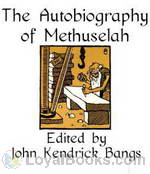 The Autobiography of Methuselah
The Autobiography of Methuselah
A satirical look at early biblical events from the point of view of someone who was there to witness most of them: the oldest man in recorded history. | |
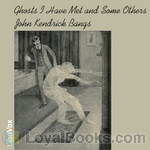 Ghosts I Have Met and Some Others
Ghosts I Have Met and Some Others
New York-born John Kendrick Bangs was associate editor and then editor of Life and Harper magazines, eventually finding his way into the Humour department. Here he began to write his own satire and humour. Ghosts I Have Met and Some Others is a delightfully humourous collection of short tales relating encounters with ghosts. | |
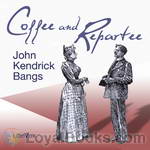 Coffee and Repartee
Coffee and Repartee
First released in 1893, Coffee And Repartee is a collection of breakfast chats at a gentlemans boarding house run by a Mrs. Smithers. Here these fellows repeatedly face questions and proclamations by an inhabitant they call The Idiot. The discussions sound friendly under pretense, but are really sly battles of ribald wit and cunning charm, as well as rather offensive remarks during a time period considered by many to favour a height of refined etiquette. The Idiot spars well, but will the other residents get the better of him? | |
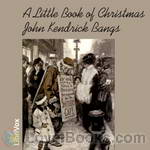 A Little Book Of Christmas
A Little Book Of Christmas
Summary: Four short Christmas stories, a bit sentimental, but still affecting and worthwhile. Plus Four Christmas verses. (Summary by David Wales) | |
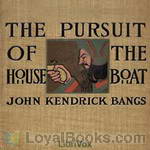 The Pursuit of the House-Boat
The Pursuit of the House-Boat
This sequel to Bangs' A House-Boat on the Styx continues the "thought-experiment" of bringing various historical and fictional figures together, detailing the adventures of the ladies of Hades after they are kidnapped by pirates and the attempts of the Associated Shades (led by Sherlock Holmes) to retrieve their house-boat. (Introduction by Emma Joyce) | |
 R. Holmes and Co.
R. Holmes and Co.
Raffles Holmes is introduced in these stories as the son of the great Sherlock Holmes. He is also revealed to be the grandson of A.J. Raffles, a gentleman thief pursued by Sherlock Holmes many years earlier. This apparently contradictory family background sets the stage for his colorful and amusing adventures. | |
 The Pursuit of the House-Boat Being Some Further Account of the Divers Doings of the Associated Shades, under the Leadership of Sherlock Holmes, Esq.
The Pursuit of the House-Boat Being Some Further Account of the Divers Doings of the Associated Shades, under the Leadership of Sherlock Holmes, Esq.
| |
 The Bicyclers and Three Other Farces
The Bicyclers and Three Other Farces
| |
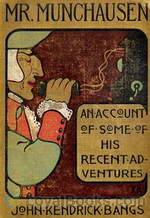 Mr Munchausen
Mr Munchausen
The author has discovered for us in this volume the present stopping place of that famous raconteur of dear comic memory, the late Hieronymous Carl Friederich, sometime Baron Munchausen, and he transmits to us some further adventures of this traveler and veracious relator of merry tales. There are about a dozen of these tales, and, judging by Mr. Bangs' recital of them, the Baron's adventures on this mundane sphere were no more exciting than those he has encountered since taking the ferry across the Styx... | |
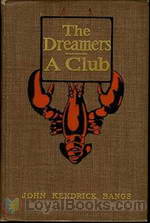 The Dreamers A Club
The Dreamers A Club
| |
 Over The Plum Pudding
Over The Plum Pudding
Great Caesar’s ghost and shades of A Christmas Carol! Stories – some ghostly, some Christmas, some humorous, some all three -- twelve of them by a master story teller and humorist of the late nineteenth and early twentieth centuries. | |
 Olympian Nights
Olympian Nights
| |
 Enchanted Typewriter
Enchanted Typewriter
The Enchanted Typewriter is a collection of short stories by the American author John Kendrick Bangs, written in 1899 in the style that has become known as Bangsian fantasy. Bangs attributes many of the stories to the late (and invisible) James Boswell, who has become an editor for a newspaper in Hades, and who communicates with the author by means of an old typewriter. The fantasy stories in this book are part of the author's Hades series, named for the stories' setting. | |
 Paste Jewels
Paste Jewels
| |
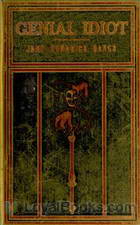 Genial Idiot
Genial Idiot
John Kendrick Bangs once again takes us on a journey with the loveable, but somewhat self-opinionated and irritating Mr Idiot. | |
 Mrs. Raffles
Mrs. Raffles
Mrs. Raffles, widow of the now deceased A. J. Raffles (who was the gentleman thief pursued at one time by Sherlock Holmes), continues the family legacy of crime—but this time in America. These stories are narrated by her cohort, Harry “Bunny” Manders, previously the devoted friend and sidekick of A.J. Raffles before his death. | |
 Water Ghost and Others
Water Ghost and Others
Eight ghost stories by a master story teller and humorist of the late nineteenth and early twentieth centuries. | |
 Mr. Bonaparte of Corsica
Mr. Bonaparte of Corsica
| |
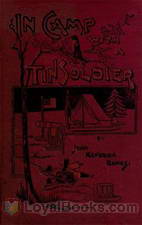 In Camp With A Tin Soldier
In Camp With A Tin Soldier
| |
 Jack and the Check Book
Jack and the Check Book
Bangs is in top form in his version of this small collection of timeless fairy tales. If you don't immediately recognize Jack and the Check Book, Puss, the Promoter, and the Golden Fleece, don't worry, you soon will. | |
 A Rebellious Heroine
A Rebellious Heroine
| |
 Toppleton's Client
Toppleton's Client
A pre-eminent legal firm gets far more than it bargained for when it hires the son of its late senior partner, Hopkins Toppleton, Sr., simply to retain the illustrious family name on the company masthead. Knowing Jr. is a loose cannon, their strategy is to pack him off to the UK to head up a European branch of the firm - a branch they have no intention of sending work. The unwitting Hopkins Toppleton, Jr. is, however, determined to make his mark. | |
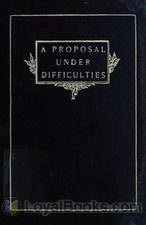 A Proposal Under Difficulties A Farce
A Proposal Under Difficulties A Farce
| |
 The Booming of Acre Hill And Other Reminiscences of Urban and Suburban Life
The Booming of Acre Hill And Other Reminiscences of Urban and Suburban Life
| |
By: Sir Thomas More (1478-1535) | |
|---|---|
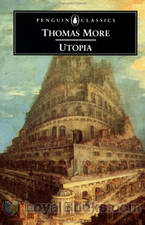 Utopia
Utopia
He was a trusted aide of Henry VIII, but when he supposedly opposed the monarch's second marriage, he was thrown into prison and executed for treason. More than two hundred years later, he was canonized as the patron saint of statesmen and politicians by the Catholic Church. Philosopher, writer, diplomat, lawyer, Renaissance man, avid gardener, humanist thinker and statesman are only some of the words used to describe him. A lifelong opponent of Protestantism who was rumored to have had heretics imprisoned, murdered and burned at the stake, Thomas More is even today an enigmatic figure... | |
By: Philip Verrill Mighels (1869-1911) | |
|---|---|
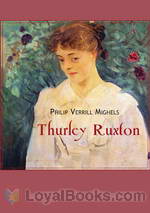 Thurley Ruxton
Thurley Ruxton
This is a rags to riches romance about an exceedingly beautiful, poor, young girl (Thurley Ruxton) who is mentored by one of New York’s elite hostesses. In order to draw them into her social circle, she allows all the famous and moneyed populous of Gothem to believe that Thurley is the princess Thurvinia hiding in New York to escape an arranged marriage. This causes all manner of high drama and romance with a suitable ending. | |
 As It Was in the Beginning
As It Was in the Beginning
| |
 The Furnace of Gold
The Furnace of Gold
| |
 Bruvver Jim's Baby
Bruvver Jim's Baby
| |
By: Percy Bysshe Shelley (1792-1822) | |
|---|---|
 Shelley: Selected Poems and Prose
Shelley: Selected Poems and Prose
The English Romantic Period in literature featured a towering group of excellent poets: Wordsworth, Coleridge, Byron, Shelley and Keats. If we add in forerunners Burns and Blake, we have perhaps an unmatchable collection of writers for any era. Of these, Percy Bysshe Shelley was one of the brightest and best, coupling a giant intellect with a highly emotional and impetuous nature. He was always a champion of liberty, but was largely ignored when he tried to promote political and social reform. He... | |
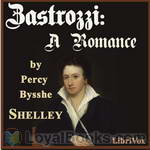 Zastrozzi, A Romance
Zastrozzi, A Romance
“Would Julia of Strobazzo’s heart was reeking on my dagger!”From the asthmatic urgency of its opening abduction scene to the Satanic defiance of the villain’s departure “with a wild convulsive laugh of exulting revenge”, this first of Shelley’s Gothic novelettes recycles much sensational boyhood reading and also points to some of his more mature concerns.It is the ego-driven pursuit of passionate extremes, revenge included, which consigns figures like Zastrozzi and the murderous Matilda to an isolation which is socially destructive as well as self-annihilating... | |
 A Defence of Poetry and Other Essays
A Defence of Poetry and Other Essays
| |
 The Complete Poetical Works of Percy Bysshe Shelley — Volume 1
The Complete Poetical Works of Percy Bysshe Shelley — Volume 1
| |
 Adonais
Adonais
| |
 The Daemon of the World
The Daemon of the World
| |
 The Witch of Atlas
The Witch of Atlas
| |
 Peter Bell the Third
Peter Bell the Third
| |
By: George Edmundson (1848-1930) | |
|---|---|
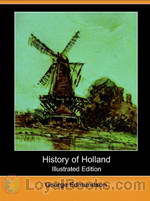 History of Holland
History of Holland
The title, “History of Holland,” given to this volume is fully justified by the predominant part which the great maritime province of Holland took in the War of Independence and throughout the whole of the subsequent history of the Dutch state and people. | |
By: Emily Post (1873-1960) | |
|---|---|
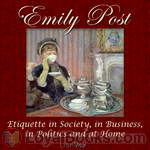 Etiquette in Society, in Business, in Politics and at Home
Etiquette in Society, in Business, in Politics and at Home
“Many who scoff at a book of etiquette would be shocked to hear the least expression of levity touching the Ten Commandments...” Thus opens the introduction to one of the most popular American non-fiction books – one that was avidly studied by both men and women, children and adults, leaders of society and those who yearned to be part of the charmed circle! Etiquette in Society, in Business, in Politics and at Home by Emily Post was first published in 1922 and became an instant bestseller... | |
 The Title Market
The Title Market
| |
By: Edward Channing (1856-1931) | |
|---|---|
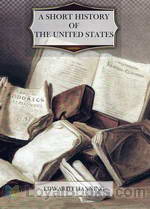 A Short History of the United States
A Short History of the United States
First published in 1908, A Short History of The United States by Edward Channing aims to provide a compact and concise account of the events that went into the making of the United States of America. Divided into 45 short chapters which are laid out point-wise, the book is designed as a school text book. Each chapter has a section at the end with a set of questions regarding the facts given in it. Beginning with theories about the first European who may have “discovered” the North American... | |
By: Logan Marshall | |
|---|---|
 The Sinking of the Titanic and Great Sea Disasters
The Sinking of the Titanic and Great Sea Disasters
Logan Marshall's book "The Sinking of the Titanic and Great Sea Disasters" gives readers a first-hand account of the greatest sea disaster of all time straight from the survivors of the ill-fated sunken ship. Unlike many of the books about the Titanic that was written recently, Logan Marshall was fortunate that he was able to interview the survivors of the Titanic and access to all the important documents about the ship, including the diagrams, maps and actual photographs related to the disaster... | |
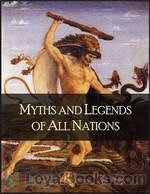 Myths and Legends of All Nations
Myths and Legends of All Nations
This excellent book contains many great stories from the various mythologies of man throughout the ages. | |
 A History of the Nations and Empires Involved and a Study of the Events Culminating in the Great Conflict
A History of the Nations and Empires Involved and a Study of the Events Culminating in the Great Conflict
| |
 The True Story of Our National Calamity of Flood, Fire and Tornado
The True Story of Our National Calamity of Flood, Fire and Tornado
| |
By: Charles Brockden Brown | |
|---|---|
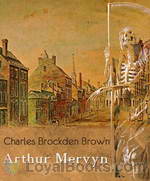 Arthur Mervyn
Arthur Mervyn
Kicked out of his parental home by his scheming young stepmother, a young country boy, Arthur Mervyn arrives in Philadelphia. Here he finds the city in the throes of a deadly yellow-fever epidemic. However, he finds a small job as a clerk and is determined to make his way in the world. He soon discovers that his employer is a con man and a murderer. One night, Arthur helps him dispose of a body in the river. While they're struggling with the corpse, the employer is swept away by the current... If you haven't encountered American Gothic before, Arthur Mervyn by Charles Brockden Brown is a great introduction to this genre... | |
 Edgar Huntly or, Memoirs of a Sleep-Walker
Edgar Huntly or, Memoirs of a Sleep-Walker
| |
 Memoirs of Carwin, the Biloquist
Memoirs of Carwin, the Biloquist
| |
 Jane Talbot
Jane Talbot
| |
 Ormond, Volume I (of 3) or, The Secret Witness
Ormond, Volume I (of 3) or, The Secret Witness
| |
 Ormond, Volume III (of 3) or, The Secret Witness
Ormond, Volume III (of 3) or, The Secret Witness
| |
 Ormond, Volume II (of 3) or, The Secret Witness
Ormond, Volume II (of 3) or, The Secret Witness
| |
By: Edward Lear (1812-1888) | |
|---|---|
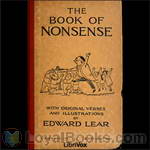 A Book of Nonsense
A Book of Nonsense
In 1846 Lear published A Book of Nonsense, a volume of limericks that went through three editions and helped popularize the form. This book contains 112 of these funny, imaginative verses that have been well loved by many generations of children (and adults). ( | |
 Nonsense Songs, Stories, Botany and Alphabets
Nonsense Songs, Stories, Botany and Alphabets
A selection of nonsense poems, songs (not sung!), stories, and miscellaneous strangeness. The work includes the "Owl and the Pussycat" and a recipe for Amblongus Pie, which begins "Take 4 pounds (say 4½ pounds) of fresh ablongusses and put them in a small pipkin."Edward Lear was an English writer, poet, cat-lover, and illustrator (his watercolours are beautiful). This recording celebrates the 200th anniversary of Lear's birth. | |
 Nonsense Drolleries The Owl & The Pussy-Cat—The Duck & The Kangaroo.
Nonsense Drolleries The Owl & The Pussy-Cat—The Duck & The Kangaroo.
| |
 More Nonsense
More Nonsense
| |
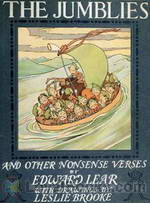 Nonsense Verses by Edward Lear
Nonsense Verses by Edward Lear
This is a collection of some of the delightful nonsense verses and stories by Edward Lear. A lot of them are also my favorites. The Jumblies, The Owl and the Pussy-cat; the Broom, the Shovel, The Poker and the Tongs; The Duck and the Kangaroo; The Cummerbund; The Dong with the Luminous Nose; The New Vestments; Calico Pie; The courtship of the Yonghy-Bonghy-Bo and Incidents in the Life of My Uncle Arly. Also included at no extra cost are two sections with my favorite Lear limericks. Only about 30 of them but they are all funny and full of delectable silliness. I hope you enjoy listening to these as much as I enjoyed recording them. | |
By: George Barr McCutcheon (1866-1928) | |
|---|---|
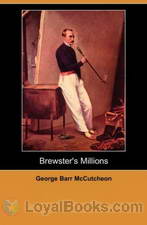 Brewster's Millions
Brewster's Millions
He hosts an all expenses paid luxury cruise to Europe for fifty guests and showers them with expensive gifts. When he's mugged in a dark alley, he insists that the thugs also take the $300 stashed away in his back pocket. He flies into a rage whenever one of his employees suggests cutting costs. Every time he places a bet, he wins, causing him even more despair! In Brewster's Millions by George Barr McCutcheon, a classic riches-to-rags tale, Montgomery Brewster is bound by the terms of an eccentric uncle's will to spend one million dollars completely within a year so that he can lay claim to an even bigger fortune... | |